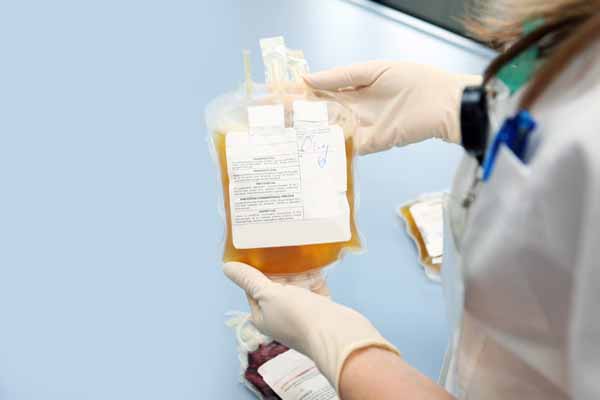
Texas physicians should continue to encourage recovered COVID-19 patients to donate convalescent plasma despite concern that its effectiveness has not been demonstrated conclusively in randomized trials.
While there are no scientifically proven treatments yet for the coronavirus that causes COVID-19, convalescent plasma is one of the more promising options. However, more research is needed to show that it is effective in treating the virus, or for which patients it would be useful. Studies have demonstrated that it is generally very safe.
“The idea is that a person who has recovered from COVID-19 has antibodies [that fight the disease] in their system, there in the plasma,” pathologist Susan Rossmann, MD, chief medical officer at the Gulf Coast Regional Blood Center in Houston and chair of the Texas Medical Association’s Subcommittee on Transfusion and Transplantation has said. “So you can take plasma from these people and give it to people who need help fighting COVID.”
The U.S. Food and Drug Administration on Aug. 23 issued an emergency use authorization (EUA) for investigational convalescent plasma for the treatment of COVID-19 in hospitalized patients, based on findings it outlined in a decision memorandum. FDA clarified the EUA path in guidance issued Sept. 2.
“Based on scientific evidence available … it is reasonable to believe that COVID-19 convalescent plasma may be effective in lessening the severity or shortening the length of COVID-19 illness in some hospitalized patients,” FDA said when the EUA was issued. “The agency also determined that the known and potential benefits of the product, when used to treat COVID-19, outweigh the known and potential risks of the product.”
However, the National Institutes of Health (NIH) on Sept. 1 said it could not recommend for or against the use of convalescent plasma to treat the illness, based on reviews of published and unpublished data, including the FDA analyses that supported the EUA.
“There are currently no data from well-controlled, adequately powered randomized clinical trials that demonstrate the efficacy and safety of convalescent plasma for the treatment of COVID-19,” NIH said. “Uncertainty remains about the efficacy and safety of convalescent plasma due to the lack of a randomized control group.”
Because more studies are needed to determine whether convalescent plasma is safe and effective for treating COVID-19, more plasma – for studies and for clinical use – is needed. That’s why physicians should encourage recovered patients to donate plasma.
TMA also reminds physicians to exercise their clinical judgment when considering any drugs or therapies to treat COVID-19 and to take all appropriate steps when making any treatment decision.
TMA has created a webpage on donating plasma that includes links to donation sites.
You can also find the latest news, resources, and government guidance on the coronavirus outbreak by visiting TMA’s COVID-19 Resource Center regularly.